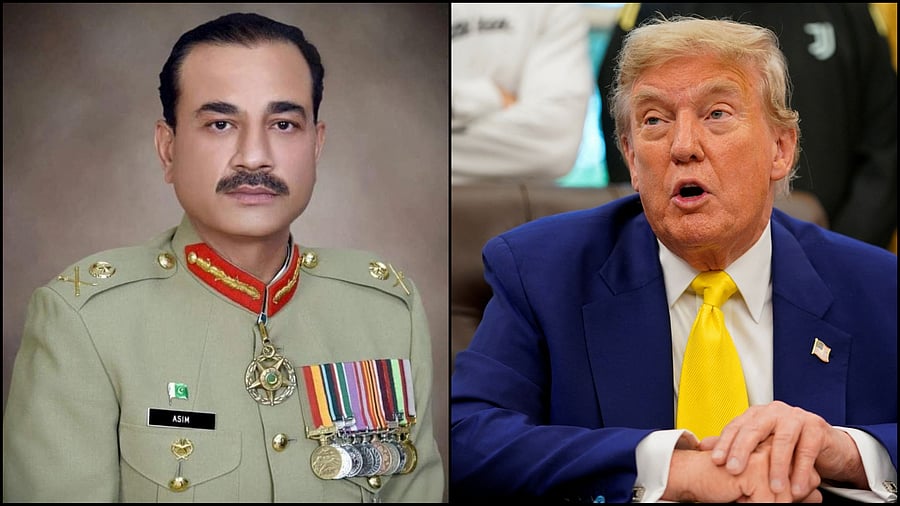
Pakistan Army chief Asim Munir (L) and US President Donald Trump (R).
Credit: Reuters Photos
On June 18, United States President Donald Trump met Pakistan Chief of Army Staff (COAS), Field Marshall Asim Munir at the White House. Trump said that he was ‘honoured’ to meet Munir and they both discussed Iran, among other topics. The Trump-Munir meeting is unusual because previous US presidents had met with Pakistan’s army chiefs only after they had assumed leadership of the country following coups.
Munir was invited by his US counterpart to take part in the 250th US Army Day celebrations in Washington on June 14. What is remarkable is the turnaround in US’ perception of Pakistan, a country Trump described in his first term as deceitful and a safe haven for terrorists.
However, times have changed since then, and this time, it appears that the US president has determined that Munir is Pakistan’s de facto head and meeting him could help Washington in many ways.
First, there is a distinct possibility that the US may join Israel in bombing Iranian nuclear facilities at Fordow, close to the holy city of Qom, which are about 90 meters underground and are used to enrich uranium. Israel does not have heavy bunker buster bombs or the long-range weapons to deliver these bombs to destroy the facility. Trump is on record saying that he wants victory in the current war against Iran. The US has already stationed B-2 bombers at the Diego Garcia air base in the Indian Ocean.
Second, Iran’s supporters, such as China, Russia, North Korea, and some Islamic countries, would react sharply against such a move. By having Munir on his side, Trump is ensuring that Iran’s supporters will be divided, as Pakistan has good ties with them. It is highly unlikely that politicians in Pakistan will stand up to Munir, especially given what happened to former prime minister Imran Khan, who is currently behind bars. Third, Munir can help the US by loaning some pilots to bomb Iran or allowing the US to set up ‘facilities’ in Pakistan to monitor the future development of nuclear weapons by Iran. Fourth, Munir is likely to take care of Trump’s interests too, related to concessions on the mining of minerals, oil imports, and crypto trade in Pakistan.
As a quid pro quo, the Trump administration will strengthen Pakistan’s military capabilities by providing substantial new military aid, offering fifth-generation F-35 fighter aircraft, and selling AWACS planes to enhance its air defence capabilities. This assistance will reduce Pakistan’s overdependence on China. Unfortunately, this military aid will help boost Pakistan’s military capabilities against India.
The Trump administration is none too happy that India is not agreeing to its directions on talks with Pakistan, including a compromise on the Kashmir issue! To increase the pressure on India, the Trump administration may station some fighter aircraft in Bangladesh and provide advanced machine guns and weapons to the Bangladesh Army — ostensibly to be used against the rebels in Myanmar; but this is also likely to be aimed against India.
On June 17, in his address at the G7 summit in Canada, Prime Minister Narendra Modi slammed the West for its duplicity in tackling terrorism, asking why it was openly rewarding countries that support terrorism (the reference to the IMF and the World Bank aid packages to Pakistan). He asked countries to differentiate between the perpetrators and victims of terror, and said that “turning a blind eye towards terrorism for the sake of vested interests or extending support to terrorists is a betrayal of all humanity”.
Trump invited Modi to Washington on his way back from the G7 summit, but the invite was declined due to Modi’s ‘prior programmes’. However, the two leaders had a 35-minute phone call where Modi made it clear to him that there was no scope for external mediation in talks with Pakistan. Trump, however, is likely to rake up this issue again.
These days, senior US officials are saying that they want good relations with both India and Pakistan. It is another matter that both Joe Biden and Trump allowed India no such leeway in continuing its close historical ties with Russia and Iran, and wanted New Delhi to tone these down.
Trump’s growing bonhomie with Munir is likely to cast a dark shadow on India’s efforts to improve its ties with the new US administration. Indian military planners will have to reckon with the availability of fifth-generation US and Chinese fighter aircraft and AWACS planes with Pakistan. Munir will become more emboldened and recalcitrant in aiding and abetting cross-border terrorism against India.
India will have to deal with a more difficult external environment with both the US and China supporting a hostile Pakistan. On the bright side, Trump is known to quickly change his views. Until then, India-US ties are likely to go through a rough patch.
(Yogesh Gupta is a former ambassador and secretary, Ministry of External Affairs, New Delhi.)
Disclaimer: The views expressed here are the author's own. They do not necessarily reflect the views of DH.